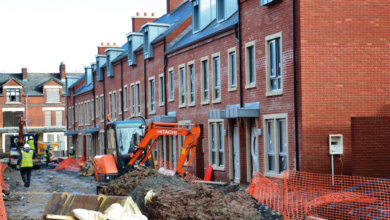Future housing policy

As Northern Ireland readies itself to implement a fresh housing delivery plan, Head of Housing Policy and Performance Division of the Department for Communities, Ian Snowden, says that a prolonged period of political uncertainty will have implications for building on past successes.
 Addressing delegates at agendaNi’s Housing Conference 2017, Ian Snowden is quick to point out that civil servants have a limited scope of decision making powers in the absence of a politically agreed budget. “What we get is an allocation of cash to keep services running but because there is no agreed budget on a political level then there is no agreed political decision on how resources should be allocated,” he says. “The default position is that everything remains more or less the same within whatever cash allocation is available to you.”
Addressing delegates at agendaNi’s Housing Conference 2017, Ian Snowden is quick to point out that civil servants have a limited scope of decision making powers in the absence of a politically agreed budget. “What we get is an allocation of cash to keep services running but because there is no agreed budget on a political level then there is no agreed political decision on how resources should be allocated,” he says. “The default position is that everything remains more or less the same within whatever cash allocation is available to you.”
Snowden highlights that prioritising areas for extra resources or redirecting funding is not “within the gift” of a civil servant, instead they seek to operate a holding position until a budget can be agreed. The implications of this, he states, are wide-ranging: “This unfortunately means that, for example, with Supporting People providers and other third party organisations, all we can do is give them a very limited window of assurance about what the funding is for next year, with no guarantee that it will remain the same for the entirety of the year.”
The senior civil servant was speaking as Northern Ireland’s five-year housing strategy (2012-2017) draws to a close. Elements of that programme, including the introduction of two major pieces of primary legislation in the form of the Houses in Multiple Occupation Act 2016 and the Housing (Amendment) Act 2016, were a success, as was a significant review of the Supporting People programme and the formation of the tenancy deposit scheme and the landlord registration scheme.
However, the calling of a snap election meant the suspension of several reviews, which will help shape a fresh Housing Strategy. These include a review of the out-dated Housing Fitness Strategy, which was close to completion, progress on the current consultation on private rented sector regulation and the publication of a review into social housing allocation policy.
Work on a draft Housing Delivery Plan – operating under the new outcomes-based Programme for Government format – is advanced and Snowden points out six key themes that have been identified to help meet the outcomes and indicators of the Programme for Government.
- Increase number of new homes being built: the Department has identified a need for an additional 9,600 social homes and provide support for an additional 3,750 affordable homes through a range of programmes. Collaboration is underway within the sector to address blockages in supply around land-planning and infrastructure, aiming to speed up the supply of housing, especially in the private sector. It has also been proposed that the Department further examines the case for devolving land stamp duty, similar to Scotland.
- Bring more empty homes back into use: review of the current Empty Homes strategy alongside the Housing Executive. This area is one of those identified that would need ministerial approval for extra resources that is currently allocated to move forward.
- Ensure housing is good quality: as well as two substantial reviews to the Statutory Fitness standard and the current Fuel Poverty Strategy, the Department is also seeking a way to get the necessary investment to maintain the Housing Executive stock to the necessary standard over the long-term. It is estimated that £6.7 billion is needed over the next 30 years.
- A shared society: plans to promote a shared ethos through the development of mixed tenure/mixed use sites. A target of 200 new shared social homes annually over the next five years has been set.
- Helping people access housing: as well as reviewing the Housing Selection Scheme and a review of the private rented sector, the Department is also seeking to help first-time buyers access the market easier. A big focus is being put on helping under-represented groups access suitable housing for their needs.
- Meeting the needs of the most vulnerable: focussed largely on addressing homelessness the draft strategy proposes a new Homelessness Strategy and a range of further actions, including developing further affordable housing solutions. The theme acknowledges that homelessness is not singularly a housing issue and needs cross-departmental working.
Snowden acknowledges that the bigger elements of the draft plan are unlikely to be tackled while political instability exists and no minister is in post. However, there are also other challenges facing the Department. At the same time, identifying Brexit and welfare reform as major challenges, he says that the most important challenge remains a lack of a budget. “A lot of the planned strategy cannot be done without the allocation of additional resources but we are in the situation where we don’t know what the budget is going to be for the next financial year. These are the issues and obstacles that need to be negotiated to secure policy delivery.”





